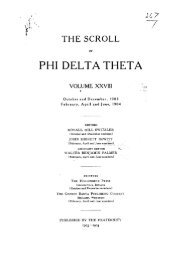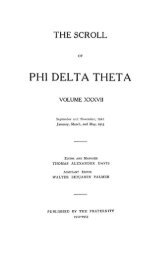1993 Volume 116 No 1–4 - Phi Delta Theta Scroll Archive
1993 Volume 116 No 1–4 - Phi Delta Theta Scroll Archive
1993 Volume 116 No 1–4 - Phi Delta Theta Scroll Archive
Create successful ePaper yourself
Turn your PDF publications into a flip-book with our unique Google optimized e-Paper software.
knew was wrong. He remains my<br />
close friend to this day.<br />
I remember my experiences in my<br />
chapter when I was an undergraduate.<br />
I was hazed. Almost nightly at<br />
dinner at the fraternity house, my<br />
feUow <strong>Phi</strong>keias and I were forced to<br />
pour iced tea down the front of our<br />
pants. We were forced to perform the<br />
fraditional oUve races. And we were<br />
paddled.<br />
Later, after I was initiated, I<br />
hazed. I made my friends do calisthenics<br />
with wads of tobacco in their<br />
mouths. I fought with a good friend<br />
one night, because I had made him<br />
eat off the floor.<br />
My attitudes toward hazing<br />
changed when I saw my best friend<br />
being hazed by the worst active in<br />
the chapter. After that night, we<br />
stopped having a "hell night."<br />
My negative feelings about hazing<br />
were reinforced when I began work<br />
in student affairs. Since working in<br />
this job, I have visited pledges in the<br />
hospital who have been hazed to the<br />
point that they suffered from "post<br />
fraumatic stress syndrome," commonly<br />
seen in rape victims. A good<br />
friend of mine buried her son after he<br />
drank himself to death during a<br />
hazing activity. It amazes me how<br />
many lives are affected by this<br />
useless and harmful tradition.<br />
Despite the fact that every<br />
fraternity and sorority has<br />
passed policies forbidding<br />
hazing, the practice continues. Greek<br />
regulation against hazing started in<br />
the early 1900s, and most states now<br />
have laws prohibiting hazing. Some<br />
speculate that a majority of our<br />
chapters hold some sort of hazing<br />
activity despite the rules and<br />
continued education against it.<br />
In the past two months alone,<br />
there have been several disciplinary<br />
incidents involving hazing in<br />
chapters of <strong>Phi</strong> <strong>Delta</strong> <strong>Theta</strong>. These<br />
incidents range from harmless but<br />
idiotic to cruel and inhumane. In one<br />
recent incident, <strong>Phi</strong>keias were forced<br />
to drink alcohol, eat chili, mayonnaise,<br />
and dog biscuits, do pushups,<br />
line up and receive verbal and<br />
physical abuse from the actives, and<br />
subjected to sleep deprivation during<br />
a traditional "hell week."<br />
"I have seen some pretty ridiculous<br />
things since I've worked for<br />
General Headquarters," said Abe<br />
Cross, the Fraternity's director of<br />
chapter services. "1 think hazing<br />
continues despite our best efforts to<br />
curb it, because there is a lack of<br />
understanding of what hazing is."<br />
Many young coUege men beUeve<br />
that hazing is a tradition. When they<br />
pledge they expect the stereotypes<br />
they have of fraternities to be true.<br />
Many active members are not<br />
creative or compassionate enough to<br />
prove this new generation of fraternity<br />
men wrong. Since they themselves<br />
were hazed, the actives feel<br />
that the new pledges deserve the<br />
same punishment. Many psychologists<br />
have told me that this cycle of<br />
hazing is similar to domestic abuse<br />
where the abused eventually become<br />
the abusers.<br />
Amazingly, some chapters that<br />
haze really believe that their activities<br />
do not qualify as hazing. Some anger<br />
and accusations have been directed at<br />
General Headquarters from chapters<br />
that believe that the definition of<br />
hazing is too ambiguous.<br />
"As a practical matter it is<br />
virtually impossible to Ust every<br />
activity that qualifies as hazing," says<br />
Cross. "You need to take a very<br />
phUosophical approach and ask<br />
'What is the purpose of this activity<br />
How does it make a <strong>Phi</strong>keia a better<br />
brother'"<br />
Many chapters justify hazing by<br />
saying that there must be some<br />
hurtle, some chaUenge, some obstacle<br />
that pledges n\ust overcome to<br />
"earn" initiation. Instead of creating<br />
educational obstacles that support<br />
and encourage the <strong>Phi</strong>keias, hazing<br />
chapters create barriers, confusing<br />
demands, and mental games that are<br />
designed to discourage <strong>Phi</strong>keias from<br />
succeeding.<br />
"In their view it is a rite of<br />
passage," says Cross. "We need to<br />
get face to face with our members<br />
and talk about it. We need dialogue<br />
to come to any understanding of the<br />
problem and its solution."<br />
To eUminate hazing a chapter<br />
must first come to a phUosophical<br />
agreement regarding the purpose of<br />
the pledge program. Is the purpose to<br />
subjugate the pledges and make them<br />
servants to clean the house, run<br />
errands, and fear the actives Or is<br />
the purpose to create an environment<br />
where the <strong>Phi</strong>keias learn about the<br />
Fratemity so that they become the<br />
next generation of chapter and<br />
campus leaders<br />
"Chapters have to realize that they<br />
are in the business of creating men<br />
who wUl later be the leaders of the<br />
chapter," says Cross. "You don't<br />
want an angry, humiUated member<br />
rurming your chapter. You should<br />
want someone who's capable, loyal,<br />
and confident."<br />
Perhaps this is the most compelling<br />
argument against hazing in all its<br />
forms. Hazing doesn't make good<br />
pledges, it makes terrible members.<br />
Rick and his family came to visit<br />
me not long ago. He is doing<br />
very well in his consulting<br />
company. Since the hazing incident.<br />
Rick and I have rarely spoken about<br />
his fraternity. The investigating team<br />
guaranteed Rick's anonymity, and he<br />
and I agreed not to discuss the<br />
incident after the investigation.<br />
During his visit, we talked about<br />
his job and his two young sons. He<br />
told me that he had taken them by<br />
the chapter house.<br />
"We visited the house, and I<br />
showed them my room," he said. "1<br />
told them how tough it was being<br />
president of the chapter. I can't wait<br />
for them to get to college and pledge.<br />
The chapter is so much better since<br />
my day."<br />
I knew he felt proud that he had<br />
played a big part in making a<br />
positive change in the chapter. Seeing<br />
him reinforced my belief that we had<br />
done the right thing, and it made me<br />
feel better knowing he still believed<br />
in the value of the Greek system.<br />
1 wondered about Lee, though.<br />
Did he have children Did he want<br />
them to join a fratemity when they<br />
went to college Did he stiU have<br />
faith in the Greek system I wondered<br />
if he retained any sense of<br />
loyalty to his fraternity or to the<br />
University after what had been done<br />
to him. Hazing can make terrible<br />
alumni too. g<br />
The Author: Thomas "Sparky" Reardon,<br />
Mississippi '72, is the assistant dean of<br />
students at the University of IVlississippi.<br />
He has been a faculty member at five<br />
Leadership Colleges. He recently won<br />
Kappa Alpha National Fraternity's<br />
Interfraternal Accolade, as well as<br />
"Adviser of the Year" from the Southeastern<br />
Interfratemity Conference.<br />
Spring <strong>1993</strong> * TheScroU 55

















